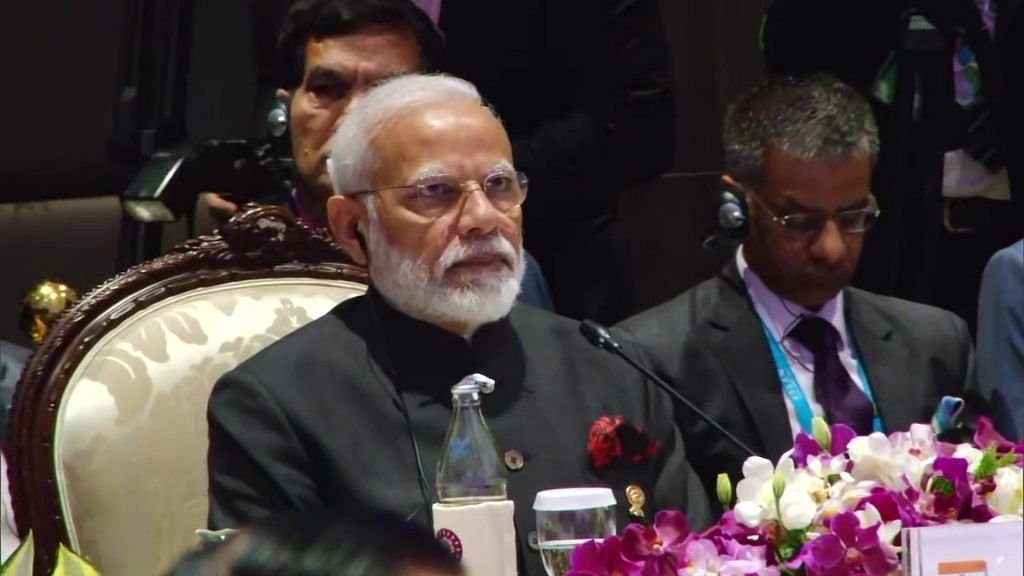India was right to walk out of the RCEP — Regional Comprehensive Economic Partnership — negotiations last year and it is right to stay out of it today. The treaty, which was finally signed by 15 countries on Sunday, will most likely tie the Asia-Pacific region’s economies even more closely to China’s than they already are. This is foolish. Greater dependence on China will only bring with it greater vulnerability before a malevolent and powerful neighbour.
The problem is that many of the people criticising the Narendra Modi government’s decision are looking at the RCEP from largely an economic perspective. Indeed, former foreign secretary Shyam Saran argues that the “economic pillar is equally, if not more, important than the security pillar.” This is simply wrong. Security consideration will always be, and indeed should always be, more important. Economic considerations can only come into play if it does not contradict security interests. The RCEP, if it works as designed, will make the countries of the region even more vulnerable to China’s economic and political coercion.
Also read: Welcome to the might-is-right global trade era
Pick security over economic interest
China’s exploitation of trade to make economic and political demands hardly requires any elaboration. Beijing has gone after countries all over the world, wielding its trade advantage as a cudgel to push countries to toe its line. Over the last few months, Australia has been facing the brunt of this, with Beijing interfering with Australian exports to China. Just this week, China ‘unofficially’ released an extraordinary letter that can only be characterised as akin to an ultimatum, demanding that Canberra take specific steps to meet Beijing’s demands, with the implicit threat of additional measures if Australia refused.
Indeed, it is China’s constant use of trade as a political weapon, and its unfair trading practices, that has led many countries to begin discussions about supply chain resilience. It is difficult to understand why countries such as Australia and Japan are doing both: discussing protection against China’s trade practices, while also adding more arrows to its trade quiver. The consequences are easy to predict: China will only push harder, and the rules of the RCEP will provide no protection.
Part of the argument appears to be that the RCEP is a reflection of the US abdicating its responsibility of engaging with and providing leadership to the region. This is odd because the choice between the US and China is not an equal one: China represents a direct security threat to most of the countries in the region, while the US does not. That is one reason why Japan and Australia are understandably deepening their security engagement, why the Quad grouping has strengthened, and why India welcomed Australia to the Malabar naval exercise. Joining a China-led trade arrangement because the US is currently unwilling to provide an alternative would appear to be a strategic equivalent of cutting your nose to spite your face, especially considering that a Joe Biden presidency might be more forthcoming on this front.
Unfortunately, those who have opposed the RCEP have also looked at this from the perspective of economic and trade policy. Indeed, even External Affairs Minister S. Jaishankar pointed to the negative domestic economic consequences of trade, arguing that “(I)n the name of openness, we have allowed subsidized products and unfair production advantages from abroad to prevail.” The problem is that the difficulties with the RCEP are not primarily its economic consequences, but rather the political ones.
Also read: There is an asymmetry at the heart of India’s complex engagement with the world
Illusion India didn’t fall for
The refusal to recognise the primacy of security is a long-standing problem, one that refuses to die despite logic and experience. Security is primary because it is impossible to pursue either economic well-being or any other value in its absence. Ignoring this comes at a cost.
Recent experience with China itself should have been a warning. The entire American and East Asian regional expectation in enmeshing their economies deeply with China was the assumption that economic realities and mutual benefits will push China towards cooperative behaviour, to become “a responsible stakeholder”, as US Deputy Secretary of State Robert Zoellick wanted China to become, citing the differences between China and the Soviet Union.
Beijing did not play to that script because it was based on a fundamentally misguided view of international politics in which conflicts were unfortunate mistakes rather than an endemic feature of international life and the mutual benefits of cooperation would be obvious to all. China did what any country would as it suddenly became rich and powerful: it decided that others must listen to it. There is no mystery here.
But China was not the first to subject economic relations to political needs. Sample the Continental system, when Napoleon tried to strangle Britain. That it didn’t succeed is not the lesson to be drawn, because China hasn’t so far succeeded in its efforts to use its economic might as an effective political weapon either. What is important is to recognise that trade will become a political weapon, especially when we are enmeshed in a new Cold War. As Adam Tooze pointed out in a recent essay, “T()he scale of China’s growth, combined with the determination of its political leadership, has undone the notional separation of economics and security policy entirely.”
Thus, almost a century after it was written, it is The Great Illusion all over again, though the passage of time has done little to improve the fortunes of the thesis. Thankfully, India has not been mesmerised by this particular illusion.
The author is a professor in International Politics at Jawaharlal Nehru University (JNU), New Delhi. Views are personal.
